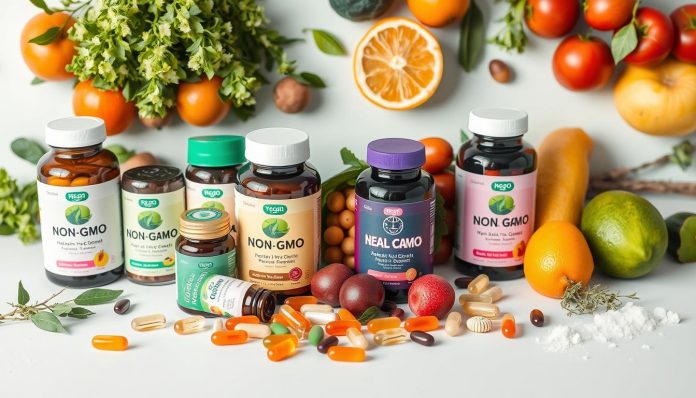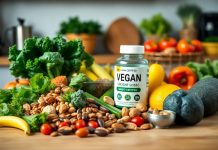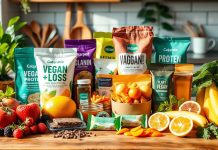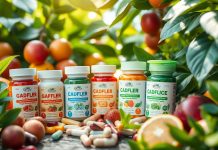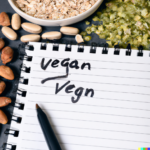Are you looking for the best non-GMO vegan diet supplements? These can help support your health and wellness goals. In this guide, we’ll look at the top plant-based options. They can boost your nutrition and bring you the benefits of a vegan lifestyle.
Vegan diets are becoming more popular, and for good reasons. They can lower the risk of health issues like high blood pressure and type 2 diabetes1. It’s important to make sure you get all the nutrients you need. This guide will help you choose the right non-GMO vegan supplements for your health.
Table of Contents
Key Takeaways
- Non-GMO vegan supplements provide essential nutrients often lacking in plant-based diets
- Vegan diets may reduce the risk of chronic health issues like hypertension and diabetes
- Consulting a healthcare provider is recommended to identify specific nutrient deficiencies
- Carefully selecting certified non-GMO and vegan-friendly supplements is important
- Incorporating plant-based proteins, vitamins, and omega-3s can support overall wellness
Understanding Non-GMO and Vegan Diet Fundamentals
Exploring clean ingredients and cruelty-free nutrition is key. Non-GMO and vegan diets are at the heart of this. They offer many benefits, like better health and less harm to the environment.
What Does Non-GMO Mean?
Non-GMO stands for non-genetically modified organisms. It means products haven’t been changed in a lab2. This ensures they’re made naturally, without tampering3.
The Importance of Vegan Diets
Vegan diets exclude all animal products and byproducts. They’re popular for their health benefits and good for the planet2. Studies show vegan diets can lower the risk of many diseases, like heart disease and some cancers2.
They also help with weight management and can lead to weight loss. Vegan diets are low in saturated fat, which is good for the heart. Vegans often have lower cholesterol levels, too2.
But, vegan diets need careful planning to get all the nutrients. Vegans might need supplements for vitamins like B12 and D, and minerals like calcium and iron2.
Learning about non-GMO and vegan diets helps us make better choices. We choose clean ingredients and sustainable supplements. These choices are good for us and the planet32.
Health Benefits of Non-GMO Vegan Supplements
Adding non-GMO vegan supplements to your diet can boost your nutrition and health. These supplements, often from organic superfoods and safe for all, fill gaps in a vegan diet. They match your values of health and ethics.
Nutritional Advantages
Non-GMO vegan supplements are great for a vegan diet. They offer vitamins and minerals like B12, D, calcium, and omega-3s. These are key for healthy blood, bones, and brain.
Supporting Overall Wellness
These supplements do more than just fill nutritional gaps. They help with digestion and gut health. They also boost your immune system and fight off diseases.
| Nutrient | Benefits of Non-GMO Vegan Supplements |
|---|---|
| Vitamin B12 | Supports red blood cell formation and neurological function |
| Vitamin D | Promotes bone health and immune system support |
| Calcium | Maintains strong bones and teeth |
| Omega-3 Fatty Acids | Contribute to brain, heart, and eye health |
Choosing non-GMO vegan supplements can improve your health. It also fits your dietary and ethical choices4.
“Vegan and plant-based supplements are highlighted for their natural ingredients, reduced risk of allergies, lasting benefits, vegan-friendly nature, and ethical considerations compared to supplements derived from animal sources.”4
Key Non-GMO Vegan Supplements to Consider
Adopting a plant-based lifestyle is great for health. It’s important to know about non-GMO vegan supplements. They give us essential nutrients and are better for the planet and animals.
Protein Powders
Protein is key for muscle repair and growth. There are many plant-based protein powders like pea, rice, or hemp5. They help vegans and athletes meet their protein needs, supporting a healthy lifestyle.
Vitamins and Minerals
Switching to vegan might mean taking extra vitamins and minerals. For example, Vitamin B12 is often missing in vegan diets65. Taking a multivitamin with B12, Vitamin D, and iron can help.
Some vegans might also need zinc, iodine, and calcium supplements. These minerals are hard to get from plants alone5.
Omega-3 Fatty Acids
Omega-3s are good for the brain and heart. While plants like flaxseeds have ALA, converting it to DHA and EPA is hard5. Algae-based Omega-3s are a reliable, eco-friendly choice for vegans.
Adding these supplements to our diet helps us meet our nutritional needs. It also supports a sustainable and ethical lifestyle65.
| Supplement | Purpose | Recommended Intake |
|---|---|---|
| Protein Powder | Muscle repair, growth, and overall body function | 20-30 grams per serving, depending on individual needs |
| Multivitamin | Fills nutritional gaps, supports overall health | 1 tablet or capsule per day, or as directed |
| Omega-3 Supplement | Brain health, cardiovascular function | 200-300 mg of DHA and EPA per day |
“Incorporating non-GMO vegan supplements into our diets can help us meet our nutritional needs while aligning with our ethical and environmental values.”
Evaluating Supplement Quality and Certification
Choosing clean, ethical wellness products means looking at the quality and certification of dietary supplements. We need to find independent verification and thorough testing. This ensures the supplements are non-GMO, vegan, and free from harmful contaminants7.
Importance of Certifications
Good supplement companies test their raw materials in labs. They check for quality, potency, and purity7. They use advanced methods like liquid chromatography and mass spectrometry to meet their standards7.
Certifications like USDA Organic and Non-GMO Project Verified show the product is safe. They also mean it’s free from genetically modified organisms and animal products7.
Recognizing Authentic Non-GMO Labels
When picking sustainable supplements, look for clear labels. They should list all ingredients7. The Certificate of Analysis (COA) proves the product meets its quality standards7.
Good brands also back up their claims with research7.
But, the supplement industry has its problems. Many products contain unapproved ingredients or don’t have the herbs listed8. Look for third-party certifications from USP, NSF, and ConsumerLab.com to ensure quality8.
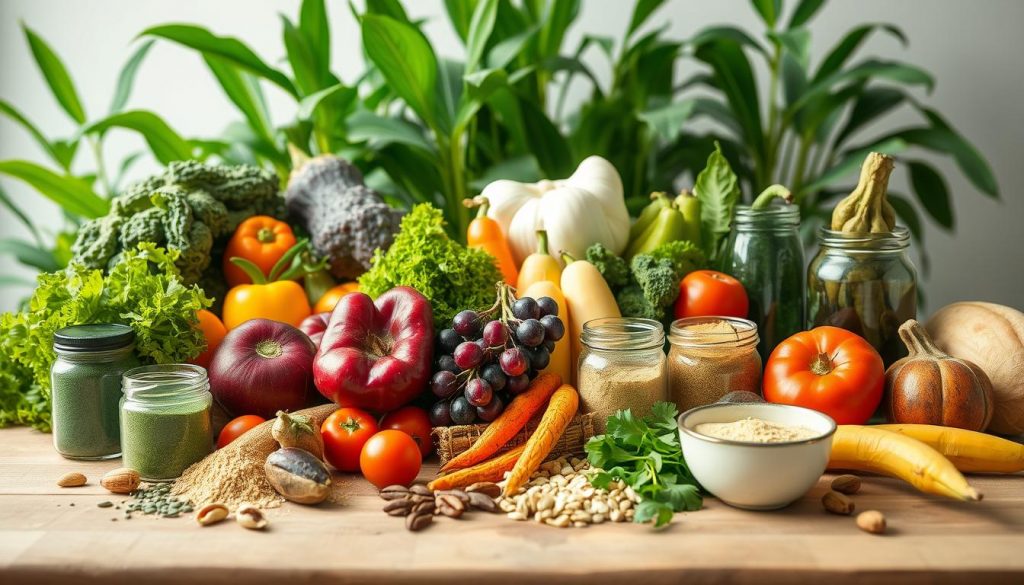
Choosing clean ingredients and sustainable supplements is key. It supports our health and the environment9. With the right certifications and transparency, we can find non-GMO, vegan products that match our values9.
| Supplement Type | Advantages | Considerations |
|---|---|---|
| Tablets | Longer shelf life, higher potency, lower cost | May require more tablets for equivalent dose |
| Capsules | Easy to swallow, quick breakdown in stomach | May require more capsules for equivalent dose |
| Softgels | Enclose liquid/oil, longer shelf life than liquids | Potentially more expensive than other formats |
| Chewables | Convenient, no water required | May contain added sugars or flavors |
| Gummies | Appealing texture, easy to consume | Can be perceived as candy, potentially added sugars |
| Powders | Cost-effective, convenient for large servings | Require mixing in liquid |
| Liquids | Offer quick absorption | Significance of absorption rate is inconclusive |
Understanding certifications and recognizing non-GMO labels helps us make smart choices. We can pick clean, ethical, and sustainable supplements for our well-being789.
“The quality of a dietary supplement is key. It affects our health and safety. Testing and third-party certification are vital for non-GMO, vegan supplements.”
Comparing Plant-Based vs. Animal-Based Supplements
Choosing between plant-based and animal-based supplements affects your health and the planet. Knowing the nutritional and environmental differences helps us make better choices. This way, we support cruelty-free nutrition, eco-friendly supplements, and sustainable living.
Nutritional Profiles
Plant-based supplements often offer better nutrition than animal-based ones. For instance, pea-quinoa protein powder has 140 calories and 22g of protein per 40-gram serving. Whey protein powder, on the other hand, has 150 calories and 26g of protein per 39-gram serving10.
Plant-based powders also have more potassium and up to 3 grams of fiber. Animal-based powders, though, have more essential amino acids and help build muscle better10.
Vegan omega-3 supplements from algae are a safe, cruelty-free choice. They don’t have mercury like some fish oil does11. Plant-based vitamins and minerals are also better for the planet. They need fewer resources and make less pollution than animal-based ones11.
Environmental Impact
Animal-based supplements, like whey protein or fish oil, harm the environment. Meat production leads to greenhouse gas emissions, deforestation, and climate change11. Plant-based supplements, on the other hand, are better for the planet. They need less resources and make fewer emissions11.
Factory farming and animal treatment are also big concerns. These issues make plant-based options more appealing for those who care about animal welfare and the environment11.
By knowing the differences between plant-based and animal-based supplements, we can choose better. These choices help us live healthier and more sustainably1011.
How to Incorporate Non-GMO Vegan Supplements into Your Diet
Adding non-GMO vegan supplements to your daily routine is easy and beneficial. They help boost your intake of plant-based proteins, natural vitamins, and organic superfoods. There are many options to choose from.
Daily Intake Recommendations
The amount of non-GMO vegan supplements you should take varies. For instance, B12 supplements are often taken 2-3 times a week12. Protein powders can be mixed into smoothies, oatmeal, or baked goods daily13. Omega-3 supplements are usually taken every day for heart and brain health12.
Always follow the product label or your doctor’s advice. This ensures you get the right amount for your health.
Popular Recipes and Ideas
It’s easy to add non-GMO vegan supplements to your meals and snacks. Mix protein powders into your morning oatmeal or post-workout smoothies13. Try recipes with organic superfoods like chia pudding or energy bites with hemp seeds, spirulina, or maca powder13.
Many people find it helpful to take their supplements with meals or in the morning. This helps keep their intake consistent.
| Supplement | Typical Daily Intake | Best Practices |
|---|---|---|
| Vitamin B12 | 2-3 times per week | Take with meals for better absorption |
| Protein Powder | Varies based on needs | Add to smoothies, oatmeal, or baked goods |
| Omega-3 Fatty Acids | Daily | Look for algae-based sources |
Always talk to a healthcare professional. They can help you find the right supplements for your needs and lifestyle.
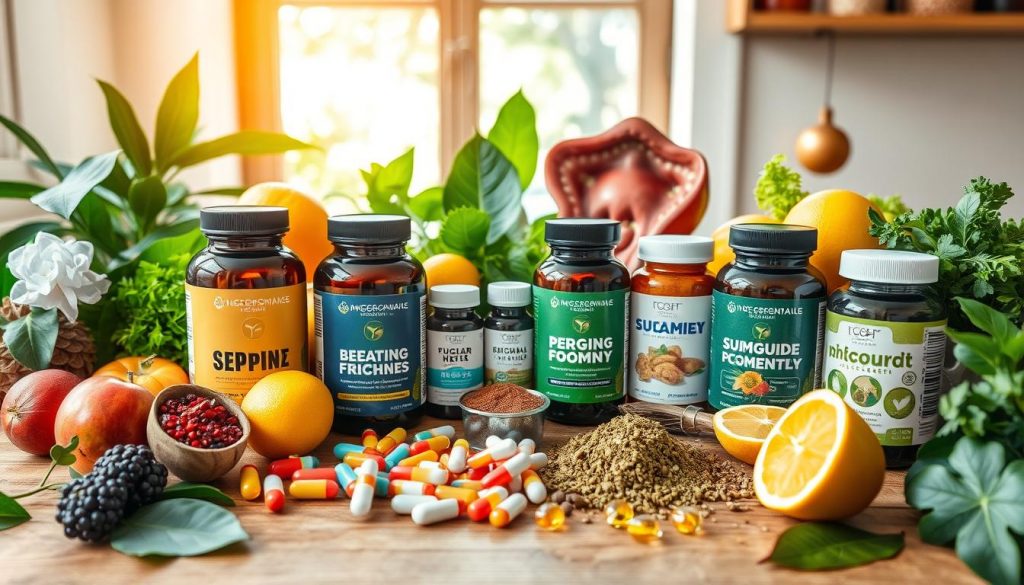
Potential Risks and Considerations
Non-GMO and vegan supplements can be very beneficial for health. But, it’s important to know about possible risks. Some people might have allergies or intolerances to certain plant-based ingredients, like soy or pea protein14. Also, taking too much of certain nutrients, like iron or zinc, can be harmful14.
Allergies and Intolerances
Always check the ingredients of any non-GMO vegan supplement. Make sure it doesn’t have any allergens or triggers. If you’re sensitive, talk to a healthcare professional before using these supplements14.
Overconsumption Risks
Non-GMO vegan supplements are generally safe. But, it’s important to stick to the recommended amounts. Taking too much of certain nutrients can cause problems and might even affect medications14. Always talk to a healthcare provider before starting any new supplements, even if you have health conditions or are on medications14.
Being aware of these risks helps you make smart choices. This way, you can safely add non-GMO vegan supplements to your wellness routine14.
“Responsible supplement use is key to unlocking the full benefits of non-GMO and vegan formulas.”
| Potential Risk | Impact | Mitigation |
|---|---|---|
| Allergies and Intolerances | Adverse reactions, digestive issues | Carefully review ingredients, consult healthcare provider |
| Overconsumption | Unintended side effects, nutrient imbalances | Follow recommended dosages, consult healthcare provider |
| Medication Interactions | Negative interactions, health complications | Consult healthcare provider before starting new supplements |
Knowing these risks helps you use non-GMO vegan supplements safely. This way, you can improve your health without worries14.
Leading Brands for Non-GMO Vegan Supplements
Looking for top non-GMO vegan supplements? There are many great brands out there. Vegan Cuts has a list of the best options.
Well-Known Options
Brands like Garden of Life, Vega, and Future Kind are well-respected in vegan supplements15. Garden of Life’s Women’s Once Daily multivitamin has important nutrients. Ritual Essential for Men Multivitamins meets the needs of vegan men15. These brands are known for quality, transparency, and ethics.
New Emerging Brands
New brands like Performance Lab and KOS are also popular16. KOS Organic Plant Protein is a clean protein source with 20 grams of protein and 2 grams of fiber16. These brands focus on new ideas, sustainability, and ethical products.
Choosing a non-GMO vegan supplement brand? Look at ingredient quality, third-party testing, and the brand’s commitment to sustainability and transparency1516. Researching and picking reputable brands ensures your supplements support your health and wellness.
“We’re seeing a growing demand for non-GMO, plant-based supplements that cater to the needs of the eco-conscious consumer. These innovative brands are leading the way in the sustainable supplements space.”
Consumer Trends in Non-GMO Vegan Supplements for 2024
The vegan supplement market is growing fast. This is because more people care about their health and the planet17. Now, people want supplements made from whole foods, tailored to their needs, and focused on specific health issues like gut health17.
Younger folks and athletes are into plant-based sustainable supplements more than ever17. There’s also a big interest in supplements with extras like adaptogens or probiotics.
Market Growth Insights
The global eco-friendly supplements market is expected to grow by 5.4% each year from 2024 to 203117. By 2031, it’s expected to reach US$1.65 billion17. North America is leading with a 40% market share, while India is a big player in South Asia & Pacific17.
Latin America, like Chile, is showing a lot of growth with a 7.1% CAGR17.
Popularity Among Different Demographics
18 The global vegan supplements market was worth USD 8.42 billion in 2023 and is expected to grow by 11.30% from 2024 to 203018. In 2021, 2.7 million UK households chose veganism for health reasons. About 230 million people worldwide, or 3% of the population, followed a vegan diet in 201818.
The vitamins & minerals segment was the biggest in 2023, with 35.25% of the market. But protein supplements are growing the fastest, with a 12.32% CAGR18.
“The rising demand for clean ingredients and sustainable products has fueled the growth of the vegan supplements market, as consumers prioritize their health and the environment.”
| Attribute | Value |
|---|---|
| Global Vegan Supplements Market Size (2023) | USD 8.42 billion |
| CAGR (2024-2030) | 11.30% |
| Vegan Population (2018) | 230 million (3% of global population) |
| Largest Revenue Share (2023) | Vitamins & Minerals (35.25%) |
| Fastest Growing Segment | Protein Supplements (12.32% CAGR) |
The big names in the eco-friendly supplements market include Axiom Foods, Glanbia plc, and NOW Health Group Inc17.. Common sources for plant-based protein supplements are wheat, soy, and pea plants17. Veganism, health awareness, and the need for weight-loss solutions are driving the market1718. But, there are challenges like consumer unawareness and high prices due to resource and processing issues1718.
Conclusion: Our Path Forward with Non-GMO Vegan Diet Supplements
The market for non-GMO vegan diet supplements is growing fast. We now have many options to support our plant-based lifestyle and ethical values. It’s important to know our nutritional needs and research the quality of products19. Non-GMO products are made without harmful chemicals, and vegan supplements don’t harm animals19.
Choosing high-quality, non-GMO vegan supplements helps us stay healthy while caring for the planet. This choice supports sustainability and environmental stewardship.
The future of non-GMO vegan diet supplements is bright, with new innovations in ingredients and formulas20. Studies show that plant-based diets are good for our health, helping with weight, metabolism, and inflammation20. By using these ethical wellness products, we can improve our health and the planet’s21.
Unbalanced diets lead to many global problems, like hunger and obesity21. So, it’s key to make smart choices about our supplements and food.
As we explore the world of non-GMO vegan diet supplements, let’s choose wisely. Let’s pick high-quality, non-GMO vegan supplements that support our health and values. This way, we can help create a better future for all.
FAQ
What are the health benefits of a vegan diet?
What is the difference between non-GMO and vegan?
How can non-GMO vegan supplements support overall wellness?
What are some essential vegan supplements to consider?
What should I look for when choosing non-GMO vegan supplements?
How do plant-based supplements differ from animal-based ones?
How much should I take of different non-GMO vegan supplements?
Are there any potentially harmful risks or considerations with non-GMO vegan supplements?
What are some leading brands for non-GMO vegan supplements?
What are the current trends in the non-GMO vegan supplement market?
Source Links
- What Supplements Should Vegans Take?
- Vegan Nutrition: Exploring the Health Benefits of a Plant-Based Diet
- GMO Facts – The Non-GMO Project
- Benefits of Taking Vegan Supplements
- Essential Vegan Supplements to Support Your Plant-Based Lifestyle
- 5 Key Supplements for Vegans and Vegetarians to Thrive on A Plant-Based Diet
- How to Choose Quality Supplements
- Third-party Certification Supplements
- A Doctor’s 4 Step Guide to Assessing Ingredient Quality in Supplements
- Animal vs. Plant Protein Powder: How They Compare
- Research briefing: A comparison between animal-based and plant-based foods
- Essential Vegan Supplements to Support Your Plant-Based Lifestyle
- Personalize Your Supplement Routine with This All-Vegan Wellness Brand
- Foods for Plant-Based Diets: Challenges and Innovations
- Thinking About Going Plant-Based? An RD Shares What Multivitamins & Supplements To Consider
- Do Vegan Protein Powders Really Work? Our Experts Weigh-In and Give Your Their Top Picks
- Plant-based Protein Supplements Market Analysis and Forecast 2024-2031: Increased Demand for Healthier Meat and Dairy Alternatives and Growth of Organic Food Blends Bodes Well
- Vegan Supplements Market Size And Share Report, 2030
- The Importance of Choosing Non-GMO, Gluten-Free, and Vegan Products | Alpino
- The effects of plant-based diets on the body and the brain: a systematic review
- Perspective: Striking a Balance between Planetary and Human Health—Is There a Path Forward?

